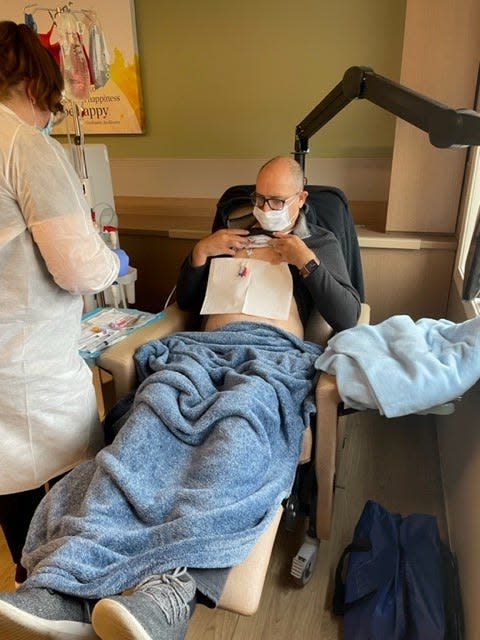Save a life in six steps. Learn how to volunteer to become a potential kidney donor

David Labocki, 48, of Copley, needs to find the right match for his third transplanted kidney or find a donor who doesn’t match, but is willing to be part of a kidney swap.
More: 'Can there be two miracles?' Copley man seeking another donated kidney relies on faith
In a kidney swap, a donor would donate the kidney to someone else and a match for Labocki would then provide a kidney.
Labocki and his wife were part of a successful three-kidney, six-person donor swap in 2018.
April 2018 story: Copley couple are part of three-way kidney swap to save multiple lives
Potential donors could help not only Labocki but many others nationwide who are in need of a kidney.
Rules for transplant programs vary by health system or program. Some have different age ranges for people they will screen.
Here are the guidelines to be a living kidney donor for the Cleveland Clinic, where Labocki is getting his care. If someone is cleared to provide a donated organ, there are no costs to the patient and the donor’s insurance typically picks up the bills.
1. Potential donors complete a questionnaire by going to clevelandclinic.org/kidneydonor. Donors can be ages 18 to 75. Donors without internet access or those experiencing difficulty can call the living donor office directly at 216-445-3150.
2. Once the questionnaire is complete, the donor will be notified by the independent living donor advocate, whose role is to advocate for the rights of the donor.
3. The living donor nurse coordinator will then review the questionnaire with the donor to ensure they are medically cleared to begin the evaluation process.
4. Once they have been medically screened and ready to proceed, the donor will go to a local Cleveland Clinic lab for a blood draw to see if they are a match. This step is to determine if they are a match for the intended recipient. Results are usually available in two to three weeks.
5. Donors who are a match will go to the Cleveland Clinic main campus for two days of outpatient testing and evaluations to determine if they are a good candidate to donate.
6. Donors who are not a direct match (incompatible) to the recipient still have the option to participate in a swap. In a swap, the living donor coordinator works to find another incompatible pair where the donor would donate to that recipient and the other donor donates to the intended recipient. With a swap, donors who are not a direct match to their recipient can still donate a kidney to benefit that patient.
Beacon Journal staff reporter Betty Lin-Fisher can be reached at 330-996-3724 or blinfisher@thebeaconjournal.com. Follow her @blinfisherABJ on Twitter or www.facebook.com/BettyLinFisherABJ. To see her most recent stories and columns, go to www.tinyurl.com/bettylinfisher.
This article originally appeared on Akron Beacon Journal: Here's information on how you can register to donate a kidney
